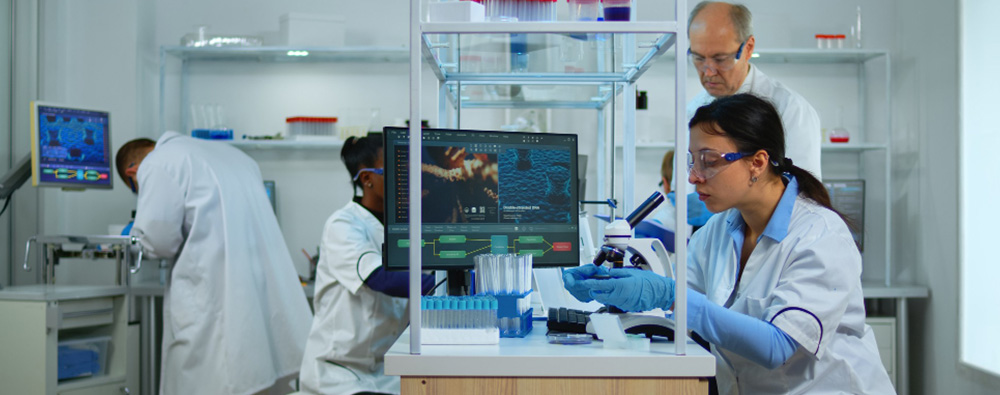
At IRAQDR, we understand the importance of accurate and timely diagnostic testing in managing your health. Our comprehensive range of laboratory services, including radiology and pathology, ensures that you receive precise diagnostics and effective treatment plans. Whether you need an X-ray, a blood test, or specialized pathology services, you can book your appointments easily through our platform. Here’s an in-depth look at the laboratory services we offer and how you can benefit from them.
Radiology Services
Radiology plays a crucial role in diagnosing and treating various medical conditions by using imaging techniques to visualize the inside of the body. Our radiology department offers a wide array of services, including:
1. X-Ray: X-rays are a quick and painless way to diagnose fractures, infections, and other conditions affecting bones and tissues. They use small amounts of radiation to create images of the inside of your body.
2. Ultrasound: Ultrasound uses sound waves to produce images of internal organs, tissues, and blood flow. It’s commonly used during pregnancy but also for diagnosing conditions in the abdomen, heart, and other areas.
3. CT Scan (Computed Tomography): CT scans combine X-ray images taken from different angles to create detailed cross-sectional images of bones, blood vessels, and soft tissues, providing more detailed information than regular X-rays.
4. MRI (Magnetic Resonance Imaging): MRI uses powerful magnets and radio waves to create detailed images of organs and tissues. It’s particularly useful for imaging the brain, spine, joints, and soft tissues.
5. Mammography: Mammography is a specialized X-ray technique used to detect breast cancer at an early stage. Regular mammograms are essential for early detection and treatment.
6. Nuclear Medicine: Nuclear medicine involves using small amounts of radioactive material to diagnose and treat various diseases, including cancer and heart disease. It provides unique information about the function and structure of organs.
7. Fluoroscopy: Fluoroscopy uses continuous X-ray imaging to view real-time movement within the body, often used during diagnostic and therapeutic procedures.
8. Interventional Radiology: Interventional radiology involves minimally invasive procedures performed using imaging guidance. It’s used for treatments like angioplasty, stenting, and biopsies.
9. Bone Densitometry (DEXA Scan): DEXA scans measure bone density and help diagnose osteoporosis and assess fracture risk.
10. Radiographic Procedures: We offer a variety of radiographic procedures to diagnose and monitor conditions affecting different parts of the body.
11. Genitourinary Radiology: This specialized imaging focuses on the urinary and reproductive systems, aiding in the diagnosis of conditions like kidney stones, tumors, and congenital anomalies.
12. Gastrointestinal Radiology: Gastrointestinal radiology provides detailed images of the digestive tract, helping diagnose conditions such as ulcers, cancers, and inflammatory diseases.
13. Functional MRI (fMRI): Functional MRI measures brain activity by detecting changes in blood flow, aiding in the diagnosis and treatment of neurological conditions.
14. Pelvimetry: Pelvimetry assesses the size and shape of a woman’s pelvis to help plan for childbirth.
15. Neuroradiology: Neuroradiology specializes in imaging the brain, spine, and nervous system, essential for diagnosing neurological disorders.
16. Cardiovascular Radiology: Cardiovascular radiology focuses on imaging the heart and blood vessels, crucial for diagnosing heart disease and vascular conditions.
17. Musculoskeletal Radiology: Musculoskeletal radiology provides detailed images of bones, joints, and soft tissues, helping diagnose injuries and diseases affecting the musculoskeletal system.
18. Pediatric Radiology: Pediatric radiology specializes in imaging for infants, children, and adolescents, using techniques that minimize radiation exposure.
19. Emergency Radiology: Emergency radiology provides rapid imaging services for trauma and emergency situations, ensuring quick diagnosis and treatment.
Pathology Services
Pathology is the study of diseases, and our pathology department offers a comprehensive range of diagnostic services, including:
1. Hematology: Hematology involves the study of blood and blood disorders, including anemia, clotting disorders, and leukemia.
2. Clinical Biochemistry: Clinical biochemistry tests measure chemicals in blood and other body fluids to diagnose and monitor diseases like diabetes, liver disease, and kidney function.
3. Immunology: Immunology tests assess the immune system and diagnose allergies, autoimmune diseases, and immunodeficiencies.
4. Microbiology: Microbiology tests detect infections caused by bacteria, viruses, fungi, and parasites, guiding effective treatment.
5. Molecular Pathology: Molecular pathology analyzes DNA, RNA, and proteins to diagnose genetic disorders and cancers.
6. Cytogenetics: Cytogenetics studies chromosomes to detect genetic abnormalities that cause diseases like Down syndrome and certain cancers.
7. Histopathology: Histopathology examines tissues under a microscope to diagnose diseases, including cancer, by studying the cellular structure.
8. Cytopathology: Cytopathology analyzes individual cells from body fluids and tissues to diagnose diseases, particularly cancers.
9. Transfusion Medicine: Transfusion medicine involves the study of blood transfusion and blood banking, ensuring safe and effective blood transfusions.
10. Clinical Pathology: Clinical pathology includes a wide range of laboratory tests on blood, urine, and tissues to diagnose diseases.
11. Forensic Pathology: Forensic pathology determines the cause of death by examining bodies, often in cases of unexplained or suspicious deaths.
12. Dermatopathology: Dermatopathology focuses on diagnosing skin diseases through microscopic examination of skin biopsies.
13. Neuropathology: Neuropathology studies diseases of the nervous system, including the brain and spinal cord.
14. Renal Pathology: Renal pathology examines kidney tissues to diagnose kidney diseases.
15. Cardiovascular Pathology: Cardiovascular pathology studies diseases affecting the heart and blood vessels.
16. Gastrointestinal Pathology: Gastrointestinal pathology focuses on diseases of the digestive tract, including the stomach, intestines, and liver.
17. Pediatric Pathology: Pediatric pathology specializes in diagnosing diseases in children, from newborns to adolescents.
18. Pulmonary Pathology: Pulmonary pathology studies lung tissues to diagnose respiratory diseases.
19. Endocrine Pathology: Endocrine pathology examines tissues from endocrine glands to diagnose hormonal disorders.
20. Urological Pathology: Urological pathology focuses on diseases of the urinary system, including the kidneys, bladder, and prostate.
Booking Your Laboratory Services with IRAQDR
Booking an appointment for laboratory tests at IRAQDR is simple and convenient. Follow these steps to ensure you get the best diagnostic services:
Visit Our Website: Go to the IRAQDR website and navigate to the laboratory services section.
Find a Lab: Use our search tool to find a laboratory near you. Filter results by location, services offered, and patient reviews.
Book Your Appointment: Schedule your appointment online at a time that suits you. Our platform offers flexible booking options to accommodate your schedule.
Visit the Lab: On the day of your appointment, visit the selected lab for your test. Ensure you bring any necessary documents and identification.
Receive Your Results: Access your test results online through our secure platform. You can also share your results with your healthcare provider for further consultation.
At IRAQDR, we are committed to providing you with high-quality laboratory services, from radiology and pathology to routine tests and specialized diagnostics. Our platform makes it easy to find and book appointments with trusted laboratories across Iraq, ensuring you receive accurate and timely medical diagnostics. Take control of your health by utilizing our comprehensive laboratory services and experience the convenience and reliability of IRAQDR
Related Blog
13 Jun 2024 | Medical Services
Top Tips for Choosing the Right Doctor for Your Needs
Discover essential tips for choosing the right doctor for your needs. Learn how ...
13 Jun 2024 | Medical Services
How Online Consultations Are Revolutionizing Healthcare in Iraq
This article explores the revolutionary impact of online consultations on health...
13 Jun 2024 | Medical Services
Understanding the Benefits of In-Person vs. Online Consultations
This article delves into the benefits of in-person versus online consultations, ...



Comments
Total 0 comment in the post